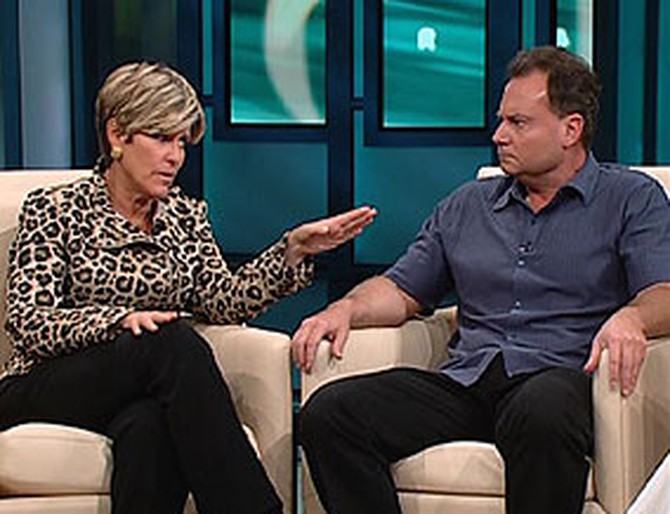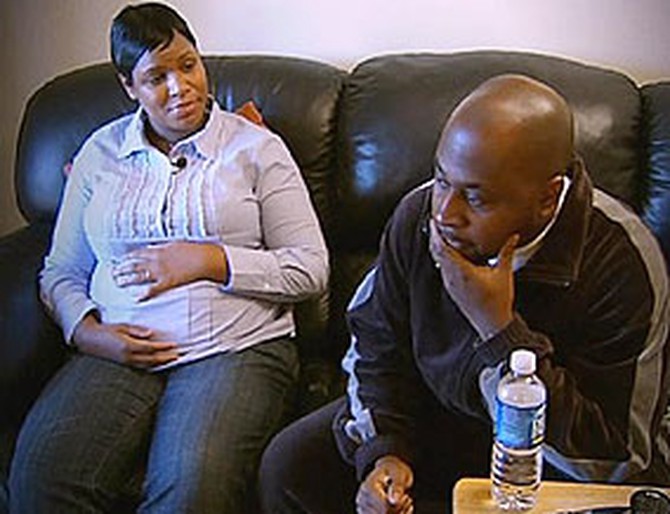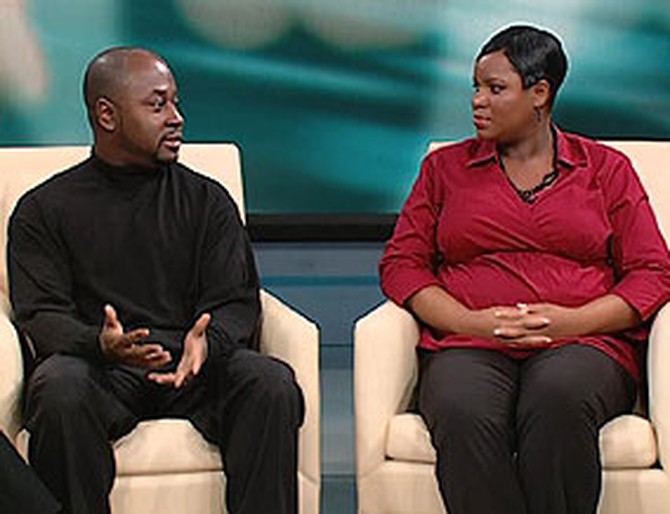Keeping Up with the Joneses
By Suze Orman

From the outside, it looks like Felice has the perfect life. She's a stay-at-home mother of six children, lives in a big house in the suburbs, drives a new car and wears expensive clothes. She may look like a million bucks, but behind closed doors, it's an entirely different story.
Like millions of Americans, Felice and her husband, Phil, are heading toward financial catastrophe by living a life they cannot afford. Although Phil brings home $5,000 or $6,000 a month, their expenses are almost three times that amount per month. Felice says she starts each day at a popular coffee chain, which adds up to $300$400 a month. Because her own six credit cards are maxed out, Felice secretly uses her husband's credit card to get cash advances.
Felice spends nearly $60 a week on tanning and manicures. "I take care of the bills, so my husband doesn't realize how much money I've spent on hair and nails and extensions. I know I've probably spent $34,000 just on the cost of the extensions in the last two years."
At home, Felice says she's spent around $5,000 on silk flowers. She also commissioned murals for almost every room of her house, which average $2,000 to $4,000 each.
Felice also shops regularlyonline and in stores. "When I do shop, I do kind of get a rush. It makes me feel good," she says. "But afterwards, though, I get depressed. I'll buy something even if I really don't like it because I have to come out with something." Felice says she hides the receipts from her husband underneath a baby blanket in a drawer.
Although she's always shopping for herself and her children, their closets are nearly empty. "I love new clothes. However, I like getting rid of the clothes just as quickly to go buy new ones." To make room for more clothes, Felice holds garage sales, which she says she likes doing almost as much as shopping. She says she'll sell a $50 item for only $1and has a great reputation for having the best stuff. "I usually have about four a year. I have six kids and I sell their toys sometimes just because I don't like them," she says.
Like millions of Americans, Felice and her husband, Phil, are heading toward financial catastrophe by living a life they cannot afford. Although Phil brings home $5,000 or $6,000 a month, their expenses are almost three times that amount per month. Felice says she starts each day at a popular coffee chain, which adds up to $300$400 a month. Because her own six credit cards are maxed out, Felice secretly uses her husband's credit card to get cash advances.
Felice spends nearly $60 a week on tanning and manicures. "I take care of the bills, so my husband doesn't realize how much money I've spent on hair and nails and extensions. I know I've probably spent $34,000 just on the cost of the extensions in the last two years."
At home, Felice says she's spent around $5,000 on silk flowers. She also commissioned murals for almost every room of her house, which average $2,000 to $4,000 each.
Felice also shops regularlyonline and in stores. "When I do shop, I do kind of get a rush. It makes me feel good," she says. "But afterwards, though, I get depressed. I'll buy something even if I really don't like it because I have to come out with something." Felice says she hides the receipts from her husband underneath a baby blanket in a drawer.
Although she's always shopping for herself and her children, their closets are nearly empty. "I love new clothes. However, I like getting rid of the clothes just as quickly to go buy new ones." To make room for more clothes, Felice holds garage sales, which she says she likes doing almost as much as shopping. She says she'll sell a $50 item for only $1and has a great reputation for having the best stuff. "I usually have about four a year. I have six kids and I sell their toys sometimes just because I don't like them," she says.

It took an intervention from her neighbor Jana for Felice to realize how bad her situation really was. Jana was so worried about her friend that she wrote a letter to The Oprah Show. "I knew she was in debt up to her ears and she wasn't taking any steps to make it any better. It was only getting worse. But mainly I did it because of the kids. And I knew that they didn't have medical insurance, and if something happened to one of the kids, it would be devastating."
Felice was upset when she found out about the letter, but she says it made her add up how much she really owed. "And then I realized, okay, there's a problem," she says.
Felice says she feels ashamed that she kept her spending habits from her husband, but she feels more ashamed that her children have no medical or dental coverage, which she says would only cost $1,000 a month. "My children have had things happen. We almost lost a daughter a couple years ago to a ruptured appendix and also I've had health problems. And I have a daughter who has a neurological disease," she says. "It's total selfishness. My kids mean the world to me and I should be putting them first, but I put myself first. It's shameful."
Her behavior really hit home, Felice says, when her daughter graduated from preschool. "She said on tape that what she wanted to be when she grew up was a mom because they like to shop a lot," she says. "That's the message I'm sending my children."
Felice says she's ready to stop living outside of herself. "I wanted people to like me and I was the only child and I got anything I wanted," she says. "And I kind of have been living the same way with my kids."
Felice was upset when she found out about the letter, but she says it made her add up how much she really owed. "And then I realized, okay, there's a problem," she says.
Felice says she feels ashamed that she kept her spending habits from her husband, but she feels more ashamed that her children have no medical or dental coverage, which she says would only cost $1,000 a month. "My children have had things happen. We almost lost a daughter a couple years ago to a ruptured appendix and also I've had health problems. And I have a daughter who has a neurological disease," she says. "It's total selfishness. My kids mean the world to me and I should be putting them first, but I put myself first. It's shameful."
Her behavior really hit home, Felice says, when her daughter graduated from preschool. "She said on tape that what she wanted to be when she grew up was a mom because they like to shop a lot," she says. "That's the message I'm sending my children."
Felice says she's ready to stop living outside of herself. "I wanted people to like me and I was the only child and I got anything I wanted," she says. "And I kind of have been living the same way with my kids."

Felice and her husband, Phil, say their financial problems are causing friction in their marriage. "I don't know what she's been spending her money on. I can't tell you. I've got a credit card out there that's got $10,000 on it, and I don't know where half of that stuff came from," Phil says. "I fear if she continues to do what she's doing, she will get us in a situation where we won't be able to pay the mortgage payment anymore."
Felice says she doesn't want to sell their house, but she also doesn't want to go back to work. "I want to stay home with my kids and be a mom," she says. "I'm totally scared. I don't want to give up stuff. It's the way I've lived my whole life. My whole life I've had stuff."
Phil says he feels hurt and disrespected. "You give your wife responsibility to take care of the family with the funds that have been given to her and then she's spending it frivolously on things that really are meaningless because she's wanting to make an impression of what she looks like," he says.
Felice says she didn't realize what she was doing. "I didn't think I was disrespectful but it is very disrespect[ful] there. I hide things from him. If I spend something that's $200, I'll tell him it's $100 or $50."
Hiding and lying about money is a behavior their children are also emulating. "Even the children hide things from me because Mommy says, 'Don't tell Daddy we bought that. He may be upset with me,'" he says. "So I hear them in the room once in a while talking, 'Don't tell Daddy we bought these shoes today. Mommy said not to tell him.' What are we teaching our children? We're setting up their marriages for failure because that's how they'll act with their spouses."
Felice says she doesn't want to sell their house, but she also doesn't want to go back to work. "I want to stay home with my kids and be a mom," she says. "I'm totally scared. I don't want to give up stuff. It's the way I've lived my whole life. My whole life I've had stuff."
Phil says he feels hurt and disrespected. "You give your wife responsibility to take care of the family with the funds that have been given to her and then she's spending it frivolously on things that really are meaningless because she's wanting to make an impression of what she looks like," he says.
Felice says she didn't realize what she was doing. "I didn't think I was disrespectful but it is very disrespect[ful] there. I hide things from him. If I spend something that's $200, I'll tell him it's $100 or $50."
Hiding and lying about money is a behavior their children are also emulating. "Even the children hide things from me because Mommy says, 'Don't tell Daddy we bought that. He may be upset with me,'" he says. "So I hear them in the room once in a while talking, 'Don't tell Daddy we bought these shoes today. Mommy said not to tell him.' What are we teaching our children? We're setting up their marriages for failure because that's how they'll act with their spouses."

Suze Orman, author of Women & Money: Owning the Power to Control Your Destiny , has helped millions of families take control of their money and is here to help Felice and Phil. "I want to set everything straight first. I don't want any of youand I mean any of you here in the audience or at hometo be judging these two," Suze says. "Because if you think that they are really any different than most of the people in America today, I'm here to tell you, they're not. Of course they're to the extreme. But every one of us, every one of you does the same thing in your own way."
Suze also says she's not here to save anyone. "This is all about us giving you the information that you need to save yourselves," she says.
Suze has some tough love for Felice. "I personally don't believe you're selfish. I think you're selfless. I think because you don't have a self, because you don't know who you arethat is why you're doing these things that you are doing. You are just simply trying to find yourself," she says. "You are trying to define yourself by the things that you buy rather than you define the things around you. And you keep buying new and new things because you can't find the definition of yourself."
Phil is at fault as well, Suze says. "Don't you dare sit here and act like she has been deceiving you because you have been deceiving yourself. You are a father who sees that you have six children. You knew you didn't have insurance for them," Suze says. "But you say it's disappointing because your wife, you've given her this responsibility to pay the bills. Where were you in this? Why didn't you show up knowing what she was doing? Was it easier for you just to stick your head in the mud and blame it all on her? No wonder she doesn't feel good about herself either. Because her husband wasn't even reaching out to say to her, 'Stop it. Stop it,' and putting your foot down, so you [Felice] just kept doing it. So we have a totally dysfunctional relationship with money, and we have a dysfunctional relationship with each other. But where does it all start from? A dysfunctional relationship with ourselves."
Suze says she won't ask Phil and Felice "why" or delve into their pasts. "Give me a break. You are an adult. You are a mother and a father of six innocent children. That they don't have any idea that this is going on," she says. "I don't want us to look back at what we had. I don't care about the past. All I care about from this day forward is the future and how can we impart the inner being that you need so that you can turn around and make more out of less. That you have a desire to save yourself."
Suze also says she's not here to save anyone. "This is all about us giving you the information that you need to save yourselves," she says.
Suze has some tough love for Felice. "I personally don't believe you're selfish. I think you're selfless. I think because you don't have a self, because you don't know who you arethat is why you're doing these things that you are doing. You are just simply trying to find yourself," she says. "You are trying to define yourself by the things that you buy rather than you define the things around you. And you keep buying new and new things because you can't find the definition of yourself."
Phil is at fault as well, Suze says. "Don't you dare sit here and act like she has been deceiving you because you have been deceiving yourself. You are a father who sees that you have six children. You knew you didn't have insurance for them," Suze says. "But you say it's disappointing because your wife, you've given her this responsibility to pay the bills. Where were you in this? Why didn't you show up knowing what she was doing? Was it easier for you just to stick your head in the mud and blame it all on her? No wonder she doesn't feel good about herself either. Because her husband wasn't even reaching out to say to her, 'Stop it. Stop it,' and putting your foot down, so you [Felice] just kept doing it. So we have a totally dysfunctional relationship with money, and we have a dysfunctional relationship with each other. But where does it all start from? A dysfunctional relationship with ourselves."
Suze says she won't ask Phil and Felice "why" or delve into their pasts. "Give me a break. You are an adult. You are a mother and a father of six innocent children. That they don't have any idea that this is going on," she says. "I don't want us to look back at what we had. I don't care about the past. All I care about from this day forward is the future and how can we impart the inner being that you need so that you can turn around and make more out of less. That you have a desire to save yourself."

So how bad is Phil and Felice's situation really? Suze says she's spent hours pouring over their financial records. "I've been doing this, as you know, for a long, long time. And I have never seen such disrespect for money as in this family here," she says. "I don't even think you have any idea how bad it is, and you don't."
Phil and Felice really have $135,000 in credit card debt. They also pay $1,700 a month for their three cars.
Their two mortgages total $658,000. Because their mortgage is a negative amortized loan, Suze says that means their mortgage will increase by $20,000 every year. "There is no longer any equity in this home at all, and all you are paying is $1,800 a month on it and that is to adjust in a few months up to $3,300 a month," she says.
They are also two weeks behind on their mortgage payment. "There is no money left in any bank accounts. All your credit limits are almost used up," Suze says. "And Felice is willing to say 'I am in trouble' because she can no longer get any cash advances to pay the bills."
So how bad is it on a scale of 1 to 10? "Maybe 1,000, and I don't say that lightly," Suze says.
Phil and Felice really have $135,000 in credit card debt. They also pay $1,700 a month for their three cars.
Their two mortgages total $658,000. Because their mortgage is a negative amortized loan, Suze says that means their mortgage will increase by $20,000 every year. "There is no longer any equity in this home at all, and all you are paying is $1,800 a month on it and that is to adjust in a few months up to $3,300 a month," she says.
They are also two weeks behind on their mortgage payment. "There is no money left in any bank accounts. All your credit limits are almost used up," Suze says. "And Felice is willing to say 'I am in trouble' because she can no longer get any cash advances to pay the bills."
So how bad is it on a scale of 1 to 10? "Maybe 1,000, and I don't say that lightly," Suze says.

Suze says she cataloged the horrors of Felice and Phil's finances not to make them give up hope, but to make them understand just how important change is. "Nobody has a magic wand," she says. "All we have is the magic within our own souls to do that which we can do and deal with reality. You have now created a reality for yourself and your families that you are not going to be able to buy yourself out of."
First, Suze says Felice has to get a job immediately with an employer that will offer health insurance to her entire family. Suze suggests Starbucks, because they offer health benefits to part-time workers.
The next step is to get a life insurance policy for Phil. "If anything happens to this man, you are going to be on the street, you're not going to be able to feed your kids," Suze tells Felice. Suze recommends a 10-year level term insurance policy.
Suze's final step is the most drastic. Suze tells Felice and Phil they must sell their California home and move to Seattle, Washington. With a booming housing market and high-tech industry, Suze says Seattle is particularly well suited to both Felice and Phil's strengthsPhil is a computer contractor and Felice was once a mortgage broker.
First, Suze says Felice has to get a job immediately with an employer that will offer health insurance to her entire family. Suze suggests Starbucks, because they offer health benefits to part-time workers.
The next step is to get a life insurance policy for Phil. "If anything happens to this man, you are going to be on the street, you're not going to be able to feed your kids," Suze tells Felice. Suze recommends a 10-year level term insurance policy.
Suze's final step is the most drastic. Suze tells Felice and Phil they must sell their California home and move to Seattle, Washington. With a booming housing market and high-tech industry, Suze says Seattle is particularly well suited to both Felice and Phil's strengthsPhil is a computer contractor and Felice was once a mortgage broker.

After Suze delivers her financial prescription, Felice says she's ready but Phil is hesitant. "The move I'd have to take a look at," he says.
Suze won't back downFelice and Phil must leave California. "I love Californialove it," she says. "But it is one of the most expensive states that you can live in throughout the entire United States. They have one of the highest state income taxes around." By moving to a state with a lower income taxor one that has no state income tax, like WashingtonSuze says you can give yourself a 5 to 10 percent salary increase.
Another reason to move away is to escape their reputation as big spenders. "You need to leave all your old definitions of yourself behind," Suze says. "You do have to go into financial detox. You do have to go into financial rehab. Leave it behind and go to someplace where you can breathe some fresh financial air."
Suze even has advice for Felice and Phil's friends and family. "If you see these two coming up anywhere, you are not to lend them money," she says. "Don't you [Felice] dare go to your parents and ask for help. This is not their problem. This is your problem. Stop asking others to save you. I want you to be a woman who can save yourself."
See how Phil and Felice are doing now.
Suze won't back downFelice and Phil must leave California. "I love Californialove it," she says. "But it is one of the most expensive states that you can live in throughout the entire United States. They have one of the highest state income taxes around." By moving to a state with a lower income taxor one that has no state income tax, like WashingtonSuze says you can give yourself a 5 to 10 percent salary increase.
Another reason to move away is to escape their reputation as big spenders. "You need to leave all your old definitions of yourself behind," Suze says. "You do have to go into financial detox. You do have to go into financial rehab. Leave it behind and go to someplace where you can breathe some fresh financial air."
Suze even has advice for Felice and Phil's friends and family. "If you see these two coming up anywhere, you are not to lend them money," she says. "Don't you [Felice] dare go to your parents and ask for help. This is not their problem. This is your problem. Stop asking others to save you. I want you to be a woman who can save yourself."
See how Phil and Felice are doing now.

Corey and Shawna live in New York City. He is a computer security analyst, and she is a human resources specialist. Shawna is six and a half months pregnant. And they are nearly $300,000 in debt$230,000 in student loans and $60,000 in credit card debt.
They pay more than $1,300 a month for two luxury cars. Corey calls his car his "baby." He loves movies and has 900 DVDs in his collection and a plasma television. Shawna has a thing for expensive purses and shoes. "I have the baby's furniture on layaway, but I have these shoes that are worth nothing sitting in the closet collecting dust," she says. "I just felt so ashamed."
Just five years ago they were debt-free. Now they find themselves ducking loan collectors who call six to eight times a day. "We are late every month, so they're going to call," Corey says. "It's very stressful. Sometimes you don't even sleep."
"I'd hate to have the baby and put the baby into a situation where we are struggling because we made poor choices," Shawna says.
They pay more than $1,300 a month for two luxury cars. Corey calls his car his "baby." He loves movies and has 900 DVDs in his collection and a plasma television. Shawna has a thing for expensive purses and shoes. "I have the baby's furniture on layaway, but I have these shoes that are worth nothing sitting in the closet collecting dust," she says. "I just felt so ashamed."
Just five years ago they were debt-free. Now they find themselves ducking loan collectors who call six to eight times a day. "We are late every month, so they're going to call," Corey says. "It's very stressful. Sometimes you don't even sleep."
"I'd hate to have the baby and put the baby into a situation where we are struggling because we made poor choices," Shawna says.

While Corey and Shawna have $350,000 of debt, Suze says it is not all truly negative debt. "There's a big difference between student loan debt and credit card debt," she says. "Student loan debt is an investment in who you are today and who you want to be tomorrow. Credit card debt however, my dear friends, is you are paying for your present day desires, but your costs will be your future day needs. Oh, what kind of needs? Like feeding that baby."
Suze says when they duck collection calls from student loan lenders they're actually making those lenders very happy. "A private student loan is at about a 10 1/2 to 16 percent interest rate that compounds. That $100,000 is going to go to $200,000. It's going to go to $400,000."
Even bankruptcy can't save you from student loan repayment. "You cannot, in 99 percent of the circumstances out there, ever bankrupt a student loan," Suze says. "You can never get rid of it in bankruptcy unless there's some tremendous hardship, which you are not in, and that means that eventually they have the ability to come and garnish your wages, sir," she says. "And yet you think you're getting away with something when you don't answer the phone?"
Suze says when they duck collection calls from student loan lenders they're actually making those lenders very happy. "A private student loan is at about a 10 1/2 to 16 percent interest rate that compounds. That $100,000 is going to go to $200,000. It's going to go to $400,000."
Even bankruptcy can't save you from student loan repayment. "You cannot, in 99 percent of the circumstances out there, ever bankrupt a student loan," Suze says. "You can never get rid of it in bankruptcy unless there's some tremendous hardship, which you are not in, and that means that eventually they have the ability to come and garnish your wages, sir," she says. "And yet you think you're getting away with something when you don't answer the phone?"

It's not too late for Corey and Shawna to get out of their hole even though Shawna will soon take maternity leave, Suze says. "You create your own problems and then you feel sorry for yourself and you think you're victims," she says. "We're not victims to our circumstances. We are the creators of our circumstances."
Their combined income is $146,000, they only have a $1,200 in monthly mortgage payment and some of their costs will go down when Shawna takes her maternity leave. This means that they should be financially stable for the three months Shawna isn't working after the baby is born.
Before then, Suze says Corey and Shawna need to sell their luxuries and raise some cash. They can start by selling off the DVDs and the shoes. Next are the luxury cars. "Would I be selling my cars if I were you? Oh, you betcha I would," Suze says. "I would exchange my car'my baby'for my baby. That's what I would be doing if I were you."
Corey says he's ready to make the change and give up the possessionseven his car. "I mean, that's nothing. I'd get rid of them yesterday," he says. "That's what needs to be done because this is my baby."
Three questions you need to ask yourself before you spend another dime
Their combined income is $146,000, they only have a $1,200 in monthly mortgage payment and some of their costs will go down when Shawna takes her maternity leave. This means that they should be financially stable for the three months Shawna isn't working after the baby is born.
Before then, Suze says Corey and Shawna need to sell their luxuries and raise some cash. They can start by selling off the DVDs and the shoes. Next are the luxury cars. "Would I be selling my cars if I were you? Oh, you betcha I would," Suze says. "I would exchange my car'my baby'for my baby. That's what I would be doing if I were you."
Corey says he's ready to make the change and give up the possessionseven his car. "I mean, that's nothing. I'd get rid of them yesterday," he says. "That's what needs to be done because this is my baby."
Three questions you need to ask yourself before you spend another dime
Published 01/01/2006

